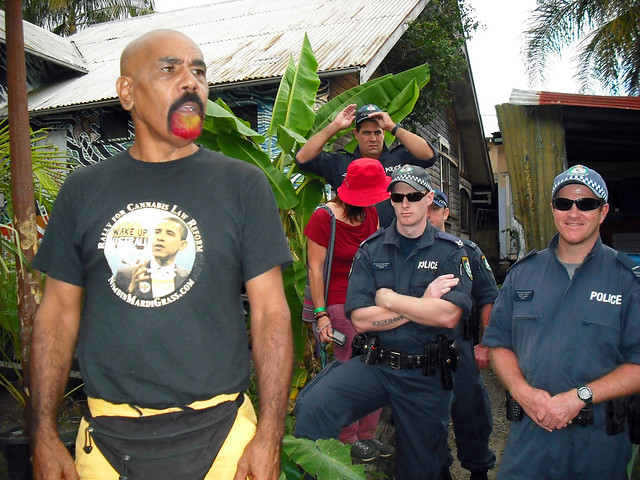Life Without Parole for Pot?
10 Worst Cases of Cruel and Unusual Punishment in the Land of the Free
by Kristen Gwynne
The U.S. government spends more than $7 billion annually to enforce marijuana prohibition in shockingly cruel ways, but the efforts have not deterred marijuana use.
The side-effects of pot are minimal, especially when compared to legal, often lethal drugs like OxyContin or Xanax. The consequences of a marijuana arrest, however, can be far more damaging than the drug itself.
America’s legal system continues to treat the plant as if the 1920s propaganda film Reefer Madness were true. In the United States -- where a marijuana arrest occurs every 42 seconds, on average -- the war on pot has disastrous consequences for its victims. Here are 10 of the most shameful examples in which the crime – related to weed -- does not even come close to matching the punishment.
1. 55 Years in Prison for $350 of Pot
Before he got busted, Weldon Angelos was a 25-year-old record producer who appeared to be on the road to stardom. Founder of the Utah-based rap label Extravagant Records, Angelos had collaborated with big names like Snoop Dogg. He had a strong future ahead of him, but now he will rot in jail until he is 80 years old, because three marijuana sales to undercover cops, worth a total of $350, got him a 55-year sentence with no chance of parole.
As Judge Paul G. Cassell pointed out, Angelos got more time than he would have for hijacking an airplane (25 years), beating someone to death in a fight (13 years), or raping a 10-year-old child (11 years). Making matters worse, the father of two didn’t even have a criminal record: he was a first time-offender.
Mandatory minimums for drug felonies involving a gun, however, stacked up to make Angelos’ weed bust a near life sentence. Angelos never used or brandished his two weapons, but because the police said they saw them -- in his center console and strapped to his ankle -- he received one five-year and two consecutive 25-year sentences.
Judge Cassell was outraged at Angelos’ mandatory sentence, calling it "unjust, cruel, and even irrational.” He urged President Bush to commute Angelos’ sentence to 18 years or less, and 29 former judges and prosecutors filed a "friend-of-the-court" brief imploring Angelos’ sentencing judge to declare the sentence unconstitutional. Unfortunately, none of those efforts were successful.
2. Cops Pose as High-Schoolers and Ruin Kids' Lives
Last year, undercover police officers posed as students in three Florida high schools. The cops behaved as normal teenagers would, going to classes, making Facebook connections and flirting with other students.
They were good at it, and one 18-year-old honor student named Justin fell in love with the cop who busted him. The attractive, 25-year-old undercover female officer spent weekends with the teenager, and the two acted as any crushing youngsters would -- sharing stories, texting and flirting. They were building a relationship, and Justin wanted to make his new girl happy.
So when the undercover cop told Justin how much she loved weed, and begged him for a connect, Justin relented, even though he didn’t smoke himself. He refused the $25 his crush tried to give him, and told her the pot was a gift. When the sting operation came down, police arrested Justin along with 31 other students, and charged him with distribution. If Justin is convicted of the felony sale, he can say good-bye to financial aid and watch his future deteriorate. Talk about a twisted relationship.
3. Life Sentence for Medication
Chris Diaz, 22, suffers from life-threatening asthma. Five years ago, he moved from Texas to California to pursue alternative treatments, and got himself a medical pot card. The treatment was working, he says. In fact, everything was going well until two years ago, when a visit to Diaz’ dying grandmother threatened to send him to jail for life.The Texas highway patrol pulled over Diaz for expired plates, searched the car and found 14 grams of weed and hash. Because of Texas' harsh hash laws, Diaz faced up to 99 years in prison for intent to sell. After nine months behind bars, including 111 days in solitary confinement, without mail, phone calls or any human contact whatsoever, his public defender came to offer him a plea deal. Terrified of a life sentence, Diaz pled no-contest to face three, instead of 99 years, behind bars. He also gave up his right to appeal.
Now, Diaz is fighting to convince legal authorities that the plea deal was coerced, and to remove the felony conviction that could haunt him for life. In the meantime, he waits in prison, unable to access his medication.
4. Snatching the Weed-Grower’s Children
An especially egregious example of state-sanctioned baby-snatching happened last year in California. On September 29, 2011, the Butte Interagency Narcotic Task Force (BINTF) forcefully entered the home of Daisy Bram and her husband Jayme Wals. Bram says masked, armed officers violently ripped her three-week-old infant from her arms, and took her 15-month-old son into custody as well. In audio of the raid, Bram is heard screaming and crying, saying she needs to breastfeed her hungry infant. “He needs to eat now. He’s a newborn,” she pleads with officers. Bram and Wals had to wait four months until Child Protective Services returned their kids from foster care.
According to reports, police raided their 38-plant garden and seized another 56 plants from inside their home. The bust came just three weeks after agents conducted a “compliance check,” ensuring that the couple, who are medical marijuana patients, were following the legal guidelines to grow pot. Bram says officials assured them that everything was fine. Regardless, Bram and Wals were later charged with eight felonies for marijuana and child abuse.
Most of the charges, including those for child abuse, have been dropped.
5. School Loans Suspended for Pot Pipe
Eighteen-year-old Marisa Garcia was about to become a freshman at California State University, Fullerton. Like most college students, Garcia could not afford to pay her tuition on her own, so she applied for financial aid. While filling out her Free Application for Federal Student Aid (FASFA) form, Garcia ran into Question #23: "Have you ever been convicted of a drug offense?"Garcia answered yes. Earlier that month, she was busted for a pipe with some marijuana residue, and paid a $415 fine for misdemeanor marijuana possession.
Because she was honest, Garcia was denied financial aid for one year. Her only other choice was to complete a six-month-long drug rehabilitation course. But Garcia couldn’t afford an in-patient treatment program, nor did she believe she had a problem that required treatment. Rather than enter rehab, Garcia was able to double her hours at a part-time job and get some help from her mother, who used credit cards and equity in her home to cover the rest of her tuition.
Garcia’s case wasn't an isolated incident. More than 200,000 students have lost federal loans, grants and work-study since the Higher Education Act adopted the Aid Elimination Penalty in 2000, many of them for weed busts.
6. Five Years for MS Sufferer
In November 2009, Wilson was sentenced to five years in prison for possessing and manufacturing marijuana plants. The judge barred Wilson from telling the jury that he grew pot to relieve his symptoms, and did not allow an expert witness to testify on the benefits of marijuana for MS patients.
Granted entry into the Intensive Supervision Program, Wilson was released from prison this June. For 16 months, he must follow an array of rules that include wearing an electronic monitor, meeting curfew and holding a job. Cruelly, he is also required to pass drug tests, even though he qualifies for New Jersey’s medical pot program.
In January 2010, New Jersey legalized medical marijuana for a variety of conditions, including multiple sclerosis. Two and a half years later, however, no dispensaries have opened.
7. Puppycide
Shooting the “stash” (or family) dog is standard in SWAT raids, the chaos of which also often includes flash-bang grenades. The Whitworth family’s experience was especially sad.In 2010 a SWAT team busted into the Whitworth family’s Missouri home at about 8:30pm. The family’s dogs barked at the loud intrusion, and the SWAT team responded by shooting them, killing a pit bull and injuring a Corgi. When 25-year-old Jonathan Whitworth learned that police had shot his dogs, he began sobbing and asking why killing the family pets had been necessary. “They were probably trying to play with you,” he cried. Making matters worse, police temporarily held his wife and 7-year-old son just feet away from their dead dog's body.
After scaring the family half to death and killing their pet, police uncovered a grinder, pipe and small amount of pot. Ironically, it was Whitworth -- the victim of a violent raid on his home, including shots fired -- who was charged with child endangerment.
8. Mother of Four Gets 12 Years for $31 Sale
A $31 pot sale can get you a 12-year prison sentence in Oklahoma. That’s exactly what happened to Patricia Spottedcrow, a first-time offender and mother of four.
An Oklahoma judge recently modified Spottedcrow’s sentence to eight years, which is still a whopping punishment for selling $30 worth of weed. The four-year reduction seems even stingier when you consider Spottedcrow’s behavior behind bars – while in prison, she took parenting classes, finished her GED and participated in several other self-improvement programs.
"Her new behavior should be noted, complimented and rewarded," the judge said. "However, she has only served a relatively short portion of her sentence. This court believes she needs more time to prepare and mature. Her past behavior had consequences. She is experiencing those consequences now."
Eight years to “prepare and mature” in a cage? How that can be good for anyone, or for their children?
An Oklahoma judge recently modified Spottedcrow’s sentence to eight years, which is still a whopping punishment for selling $30 worth of weed. The four-year reduction seems even stingier when you consider Spottedcrow’s behavior behind bars – while in prison, she took parenting classes, finished her GED and participated in several other self-improvement programs.
"Her new behavior should be noted, complimented and rewarded," the judge said. "However, she has only served a relatively short portion of her sentence. This court believes she needs more time to prepare and mature. Her past behavior had consequences. She is experiencing those consequences now."
Eight years to “prepare and mature” in a cage? How that can be good for anyone, or for their children?
9. Life in Prison for the Middleman
When he was 38, Mark Young caught a drug trafficking conviction for 700 pounds of marijuana. A middleman, Young did not distribute the pot, but introduced people looking to sell to other people who were looking to buy. That was a year and a half before police arrested him. Investigators uncovered no physical evidence -- pot, cash or anything else -- linking Young to trafficking. The testimony of co-conspirators cooperating with the government was the only evidence against him. Nonetheless, in 1992, Mark Young was sentenced to life in prison without the possibility of parole. Young had never been charged with drug dealing, and had no history of violent crime.
10. The Commonality of Life for Pot
That same year, Larry Jackson, a small-time crook with a long record of nonviolent offenses, got life behind bars for possessing less than 1/100th of a gram of pot and a little cocaine in Oklahoma.As Eric Schlosser wrote in Reefer Madness, Oklahoma is among the worst places to get busted for weed, but it’s not the only state where you can catch a life sentence for pot:
In Oklahoma City, Leland James Dodd was given two life sentences, plus ten years, for buying fifty pounds of marijuana from undercover officers in a "reverse sting." Oklahoma is not alone in handing out life sentences for buying marijuana from the government. In Tuscaloosa County, Alabama, William Stephen Bonner, a truck driver, was sent away for life without possibility of parole after state narcotics agents delivered forty pounds of marijuana to his bedroom. Raymond Pope, a resident of Georgia, was lured to Baldwin County, Alabama, in 1990 with promises of cheap marijuana; he bought twenty-seven pounds from local sheriffs in a reverse sting, was convicted, and was sentenced to life without possibility of parole. Pope's criminal record consisted of prior convictions for stealing televisions and bedspreads from Georgia motels. He is now imprisoned 400 miles from his family. He has three young children.
The consequences of a marijuana arrest can be shockingly cruel, and they go well beyond those mentioned in this brief list. Many employers fire people instantly for a drug arrest, even if it is only for a tiny amount of pot. Nonviolent marijuana users are caged alongside dangerous felons in facilities where rape and abuse are rampant.
And while the consequences of our war on pot are multifaceted, less can be said for its achievements. The government spends more than $7 billion annually to enforce marijuana prohibition, but has not successfully deterred marijuana use. In fact, more teens now smoke pot than cigarettes, but our relentless pursuit to punish marijuana users nonetheless continues apace.
Kristen Gwynne covers drugs at AlterNet. She graduated from New York University with a degree in journalism and psychology.
Help This Unique Independent Site Survive
Donate any amount and receive at least one New Illuminati eBook!
Just click in the jar -
Xtra Images by R. Ayana @ http://farm8.staticflickr.com/7045/6812898942_5508b5c3f2_k.jpg
http://farm6.staticflickr.com/5232/7378219286_94091c0217_k.jpg
http://farm6.staticflickr.com/5308/5895698213_c883b080b0_b.jpg
http://farm8.staticflickr.com/7089/7378218802_e0eba2f0c0_k.jpg
http://farm6.staticflickr.com/5232/7378219286_94091c0217_k.jpg
http://farm6.staticflickr.com/5308/5895698213_c883b080b0_b.jpg
http://farm8.staticflickr.com/7089/7378218802_e0eba2f0c0_k.jpg
For further enlightening information enter a word or phrase into the search box @ New Illuminati or click on any label/tag at the bottom of the page @ http://nexusilluminati.blogspot.com
And see
New Illuminati – http://nexusilluminati.blogspot.com
New Illuminati on Facebook - https://www.facebook.com/the.new.illuminati
New Illuminati Youtube Channel - http://www.youtube.com/user/newilluminati/feed
The Her(m)etic Hermit - http://hermetic.blog.com
The Prince of Centraxis - http://centraxis.blogspot.com (Be Aware! This link leads to implicate & xplicit concepts & images!)
This site is published under Creative Commons Fair Use Copyright (unless an individual item is declared otherwise by copyright holder) – reproduction for non-profit use is permitted & encouraged, if you give attribution to the work & author - and please include a (preferably active) link to the original along with this notice. Feel free to make non-commercial hard (printed) or software copies or mirror sites - you never know how long something will stay glued to the web – but remember attribution! If you like what you see, please send a small but heartfelt donation or leave a comment – and thanks for reading this far…
Live long and prosper!
From the New Illuminati – http://nexusilluminati.blogspot.com








